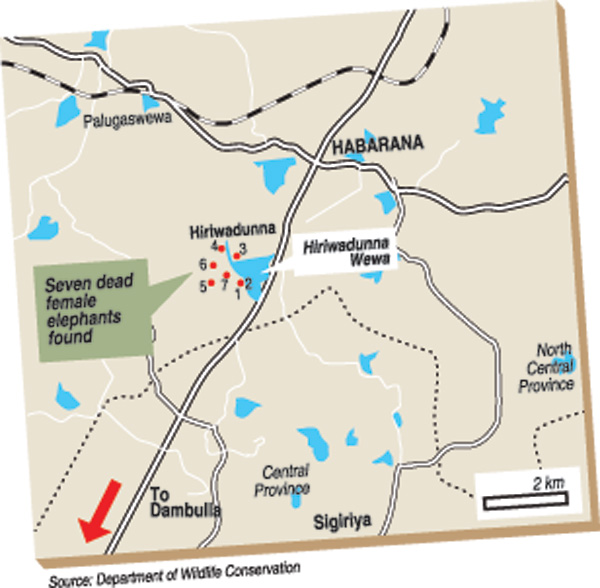News
Results from several probes awaited as mystery still surrounds death of elephants
Mystery still surrounds the deaths of seven elephants in the Tumbikulam forest reserve at Habarana, as more investigations are being carried to ascertain the cause of their tragic demise.
Following preliminary investigations by the Department of Wildlife Conservation (DWC) and the post mortem examinations, samples of body parts and stomach content were provided to the Government Analyst’s Department, Peradeniya University’s Faculty of Animal Science and the Veterinary Research Institute (VRI) at Peradeniya.
The DWC veterinary surgeons that carried out investigations said they suspected that the elephants died of poisoning but were unable to deduce how the poisonous substance had entered the digestive systems of the elephants.
Meanwhile the veterinary surgeon who carried out the postmortem examinations on the seven elephants, Chandana Jayasinghe said , “We can only come to a conclussion after studying the lab reports. We suspect there is poisoning but we do not know how the elephants got poisoned, only the lab reports would be able to confirm whether the elephants had ingested a naturally poisonous or toxic substance or humans were involved in the killing of the elephants,” he said.
He explained that the tongues of the elephants appeared blue and the there were signs of haemorrhaging in their intestines. In addition the mucus membranes in the elephant’s digestive tracks had sustained injuries.
Dr Jayasinghe suspects that whatever happened to the elephants that included six lactating females and one male, would have happened quickly as the elephants have died in close proximity to each other, about 100 meters to 1 km distance apart. He also believes that the dead elephants might be part of a larger elephant group in Kalawewa about 20 km away from the scene of the tragedy,
Meanwhile Government Analyst A Welianga told the Sunday Times they have started lab tests on the samples sent by the Wildlife Department.
He added tests are being carried out on the stomach contents and blood samples collected from the internal organs of the elephants. He also added that they would provide a report on their findings within a week.
Officials at the VRI in Peradeniya, that comes under the preview of the livestock Ministry, said, they too are investigating the samples given to them.
The institute’s head veterinary surgeon Dr H.P.D.V.S. Bandra said they received samles of tissue from the intestines of the elephants and stomach contents. He said they have not so far found anything extraordinary.
“It will take at least five days to any results,” he added.
Meanwhile Sources from Peradeniya’s Vet Faculty said that they have concluded tests on some of the samples they received and have reported back to courts. They said they have also notified courts that they are unable to carry out investigations on the rest of the samples due to lack of facilities.
Habarana Police officer in charge N.P.S Jayalath said they had provided assistance to the Wildlife Department and had also joined the Army to conduct search operations in the area.
He said they would intervene only if there was any human involvement in the deaths.He added that the Wildlife Department too had the powers to arrest and seek legal action against anyone who kills an elephant under the Fauna and Flora Protection Ordinance.
Commenting on the ongoing probe Wildlife Department’s Director General Chandana Sooroiyabandara said they suspect the elephants had ingested poisonous substance, yet how they were poisoned remained a mystery.
Meanwhile he said the report from the three member committee appointed by him was handed over to him on Friday evening. However he said he was unable divulge the findings and he was yet to study the report.
Meanwhile environmental groups are urging the government to carry out a broader investigation into the deaths. They pointed out that it was important that the ongoing probe was a joint effort among the Wildlife Department, police and the Government Analyst Department.
Elaborating their view they said if the Government Analyst report turned out to be inconclusive the same samples should be sent to universities and institutions that have facilities to test them. If all efforts fail the Government should send the samples overseas.
Environment Conservation Trust Director Sajeewa Chamikara said investigations should be expedited as it was important to ascertain whether they were killed by humans or by eating some poisonous substance as it was then important to take preventive action to save other elephants from consuming the same.
“There is a huge herd of elephants identified as the “Kalawewa herd” their lives too could be in danger,” he said.

